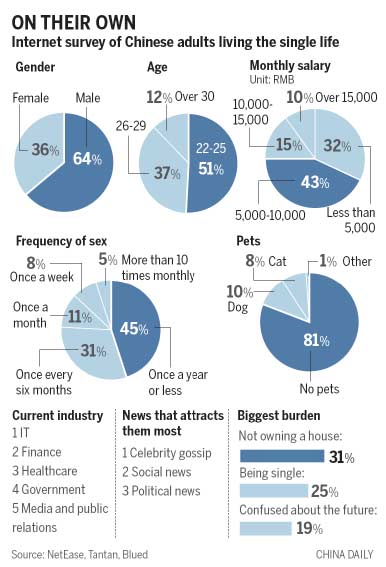Survey: Young, alone, no house and not much sex
 0 Comment(s)
0 Comment(s) Print
Print E-mail China Daily, May 5, 2017
E-mail China Daily, May 5, 2017
 |
While most watchers of Chinese society are focusing their attention on the aging population, some have turned their eyes in another direction, to an emerging group in big cities-younger men and women who live alone.
Reports say there are 50 million of them. If they were a province, it would be the 11th-most populated. Observers even created a term for this group in Chinese-kongchaoqingnian-literally "young empty-nester".
Kongchao, or empty-nest, has been used mainly in reference to parents whose children are gone. But thanks to the media's wordplay, young empty-nesters include those from 20 to 39 years old who work far from their hometown and eat and sleep on their own.
That's the definition used by Taobao, a leading e-commerce platform, which issued a wide-ranging report on Wednesday based on its trade database about this group.
They are not necessarily otaku, a Japanese concept referring to those who tend to stay at home all day and drown themselves in computer animation, comics and games. Some actually have pretty good social lives and enjoy hanging out with friends.
They do not have to be "single dogs", either-a Chinese word created to mock those who are single beyond a certain age. Some maintain long-term romances.
Neither can they be simply categorized as kenlaozu, or boomerang children, media jargon referring to those who are economically dependent on their parents. Some, though not all, earn salaries way above average.
But one thing is for sure: They feel empty. That's where the indication of the adjective kongchao, or empty nest, grabs their hearts.
As many as 68 percent of them say they have felt lonely in the past week, according to a recent survey by NetEase, a Chinese online portal website. The results were released on Thursday. Only 14 percent say they never feel empty.
The survey interviewed 5,000 young empty-nesters and looked into big data from NetEase's news service and two other online social service providers-Tantan and Blued, the latter focusing on the gay community.
Young men seem more likely to become empty-nesters than their female counterparts, at least based on the current available surveys, representing 64 percent of the respondents in the survey.
Sexual relations, too, have become a luxury. Nearly half of the young empty-nesters had only one sexual encounter in the past year. Another 31 percent made love once in the past six months. Only 5 percent said they have sex more than 10 times per month. On the other hand, 64 percent of the gay empty-nesters said they have sex at least once every month.
That said, only 1 percent of all respondents placed a sexless or low-sex life as their biggest concern. Their top three concerns: no house, no partner and no hope.





